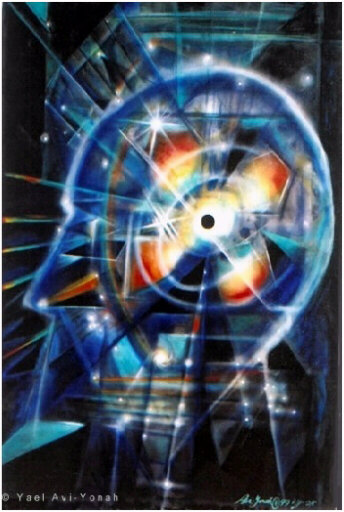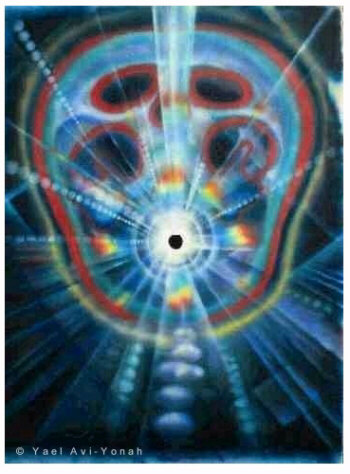 June 06
June 06
The Tree of Life
Yoseph Leib
1. Timothy Leary calls the Biblical prohibition against eating from the Tree of Knowledge the beginning of the control of substances. Eden is the first drug war. But in my Hasidic paradigm, the Tree of Knowledge is the law itself. Eating from the Tree is the step that took us, mankind, out of a simple, child-like perspective into the beginning of civilization. The Tree isn't the drug; it's the end of the drug.
2. Genesis 1:27: "I give unto you all the seed bearing herbs for your consumption." How could anyone of faith say the Torah bars marijuana? Then again, there are lots of poisonous seed bearing plants out there, so what's G-d telling us when he tells us that they're here for us?
 3. Like anything else, marijuana can be used for bad purposes -- just like Torah. Both can take away ambition, desensitize, weaken. Not true always, but often true in excess, or at least, in decadence. Decadence implies the end of Intention.
3. Like anything else, marijuana can be used for bad purposes -- just like Torah. Both can take away ambition, desensitize, weaken. Not true always, but often true in excess, or at least, in decadence. Decadence implies the end of Intention.
4. Don't take drugs unnecessarily, R. Chiya warns his son, because they'll lose their power and make you dependent on them. Unnecessarily? How do you know when it's necessary? The Talmudic rule about medicine is basically, if one thinks he needs something and another tells him that he doesn't, he can trust himself, because he knows his body better. And if one is convinced that he has no need for a certain medicine, but a healer thinks he does, he can take the healer's advice, because the healer might know better.
5. I took a course in nutritional counseling once where my beloved cannabis took a gentle beating -- it's not healthy, it turns out. Not As Bad as Reaganistic authorities would have our parents and overseers believe, but it harms ejaculation and excess speech -- the things that deplete life essence. Who knows, maybe it'll hunch your back, darken your eyes, weaken your resolve, thin your hair.
6. There's a Hasidic mystery about R. Nachman of Breslov: He says you can do anything, make anything happen, if you pray right/often/hard enough. If so, how could he die, screaming "Don't give up! There is no reason to ever give up!"? If he died, doesn't that imply that he couldn't live anymore, that it was out of his power? Why use medicine, if prayer is all the medicine we need?
7. R. Nachman also said every plant has a power, a personal angel commanding its growth, a special unique song that only he sings, a special unique idolatry bound to him, and a particular healing that it brings.
8. All those plants, they all long, not to live forever, because that is not the way of plants, but to be consumed in holiness, for the sake of good, that the sparks of their lives be burned up in a sacred fire, be it a belly or a bong. Of course, we can reject that, stay straight and not sacrifice our vitalities, instead slowing our death and avoiding the rush waves, if that's the better way to do the work.
9. A kabbalist in Jerusalem once told me that marijuana and psychedelics were only a fixing for certain kinds of souls, namely those from the universe of Chaos. The easy way you can tell if you are dealing with that kind of soul is if the work being done is based on big, wild jumps, or slow steady crawls. Slow crawls are better for long term change, the obsession of order. Lately I have surrendered more to the God of Order, and to the this-worldly responsibility demanded by the Pharaoh. The things I want demand me to be sober sometimes.
10. The holier something is, the less often you do it, and the easy way to control use of a beloved narcotic is to sacramentalize it away, saving it for special occasions. So, we made them so holy, that they were only to be touched on full moons, on solstices, on new years, on Purim. Controlled by shamans with a warrior class there to defend Their Law, given in occasional doses in a controlled temple setting, lest the people become impure, depressed, distanced from the voice of the living God. The Cohanim, Kadoshed into a vital and peripheral position, without land or property, themselves sacramentalized into prophets and writers.
11. Jerusalem is full of wounded mystics, trained and skilled at nothing but The Holy, utterly unable to do anything else in the world, much to their sexual frustration and chagrin. If they can't run yeshivas and/or be content with sitting in Kollel, can they even go to the market and sell vegetables?
12. R. Nachman tells the story of a wise man who would smoke a special herb mixture once a year, which would give him the power to ask any questions of the heavens. In one excursion, he hears the tragic love story of the Sun and the Moon, who can't consummate their love without destroying a tree that nourishes the whole world, without drying up the river that gives it life. R Aryeh Kaplan says, maybe that one day was Purim, when dangerous truths are allowed to be spoken, and all intoxication is virtuous. Have you ever felt safe knowing something like that? That your intoxication couldn't hurt anyone, could only make God happier?
13. The tree of knowledge is the end of drugs, the tap on the shoulder that tells us we have to get to work. The tree of knowledge was given to me by a girlfriend that I wanted to impress by doing things for her, defending her, making her safe from the ravages of God and death. I drank and accepted everything that my mother once told me that i would have to. And I'm not sorry. In accepting the drug, we can sit outside the garden together...
14. Terrence McKenna claims to chart the pre-history of pre-Adamic human society. He maintains that humans evolved into humans through psychedelic substances, mushrooms most notably, that made us better hunters and spoke the voices of Gods and Demons into our conscious awareness, and through these we were separated from the animals. We took them all them time, for they were everywhere, and we had no responsibilities besides hunting, gathering, and defending, to keep us from our visionary maturities. It occurred to me that Genesis is Adam's narrative, not God's, when he eats the psychedelic. He's the whole universe suddenly, a god created at the beginning, split into two waters, and grown into trees and stars, swarming reptiles and birds of the heavens. He finally lands in a body of mud and water, with life breathed into it. he's put into a deep sleep, and when he wakes, he sees his soulmate, a part of him, parallel and against, to live with. And then, the tree of knowledge of good and evil, as opposed to just plain knowledge.
15. The Sefer HaBahir, chapter 161, describes the beginning of the Israelite Law being given to Satan, by the bitter waters of Marah. The waters are sweetened only by the Tree of Life. We leave slavery in Egypt, and find ourselves longing for the security that Egypt's Law bought for us, and so, we're given a new slavery, to a more acceptable Law, as divine as any previous one if not more so.
16. The Tree of Life, in my Hasidic paradigm, is beyond good and evil, and restores my vision to the true clarity of God. If everything is God, everything is fine. Shlomo tells us that the Tree of Knowledge is "what I have to do to fix the world," and the Tree of Life is the clarity that its already eternally perfect. We let ourselves see this sometimes, but not for too long, lest our brother complain violently that we are ignoring his needs. And that's why it's illegal, so we won't forget how important stupid details like keeping the children fed are. Drugs can do that: make us forget everything. That's what they're for -- to help you forget your worries and dance. Forget how small you are, forget how big you are. Forget your trauma, forget your passion. No wonder we're so afraid of them. I'm afraid of anything that makes me fearless.
 17. The Tree of Knowledge's illusion that Something Better Should Be is not often rejected in Hassidus -- only felt, deeply, breathed into and accepted. Lies that feel so real, the sense of lack, failure. But people die for our weakness. To ask someone to give up the tree of knowledge is to ask them to give up the world. Why is the Law written? So we'll remember. When the messiah comes, and death is over, the Law won't be written any more, and the dancing will never stop.
17. The Tree of Knowledge's illusion that Something Better Should Be is not often rejected in Hassidus -- only felt, deeply, breathed into and accepted. Lies that feel so real, the sense of lack, failure. But people die for our weakness. To ask someone to give up the tree of knowledge is to ask them to give up the world. Why is the Law written? So we'll remember. When the messiah comes, and death is over, the Law won't be written any more, and the dancing will never stop.
18. Sabbaths and Sabbaticals are for the sake of returning to the old perspective. On Shabbos, I have to know that everything is fine-- no matter what I have or have not successfully done before, and there is no work pending. Everything is forgotten in the ritual song and dance, and with wine, a sanctification that reminds of the beginning of holiness, the creation of the universe, and the exodus from Egypt. Everything is already arranged. Don't worry about it anymore.
19. The Buddha held similarly. This is good, stop doing, just listen to and accept What Is, let go. The sooner we return to the truth of unity and the perfection of Now, the better, right? The only reason it's worth being alive is to help everyone else let go too. Jerusalem kabbalists I've spoken to maintain that the promise of God to Israel is that you'll never have to let go, that we'll be able to get infinitely closer without dying, without dying.
20. R. Nachman maintains that the main revelation of the messiah is through dancing, and you never have to stop, he implores on his death bed, there is no reason at all to give up the joy, the dance, the Tree of Life. If you do, don't feel bad, just come back, in a moment, you can be alive again, and dying can't stop you. This is his dangerous promise, you don't have to stop.
21. One great virtue of some drugs is that they can make you forget your limitations. As long as you stay high, you never have to stop. The great virtue of drugs is that they let you stop, finally stop, when you need to.
22. Simcha Bunim of Pshische and the Yid Hakadosh were talking one time. The last few hours before the eschaton are the worst, The Yid told his student-friend. Everything you believed in, trusted, knew turns out to be false, and even the most faithful are consumed by this torturous clarity, and who can handle the pain until the redemption comes, and remain righteous? Simcha Bunim, a pharmacologist who would travel far and wide in search of better medicines, said, hey, I have an idea: I'll just get really stoned, so that when the final travails are upon me it won't hurt at all, and by the time it's done, I'll have sobered up. Good idea, said the Yid, but the problem is knowing when to start.
Yoseph Leib is the creator of cannabischassidis









